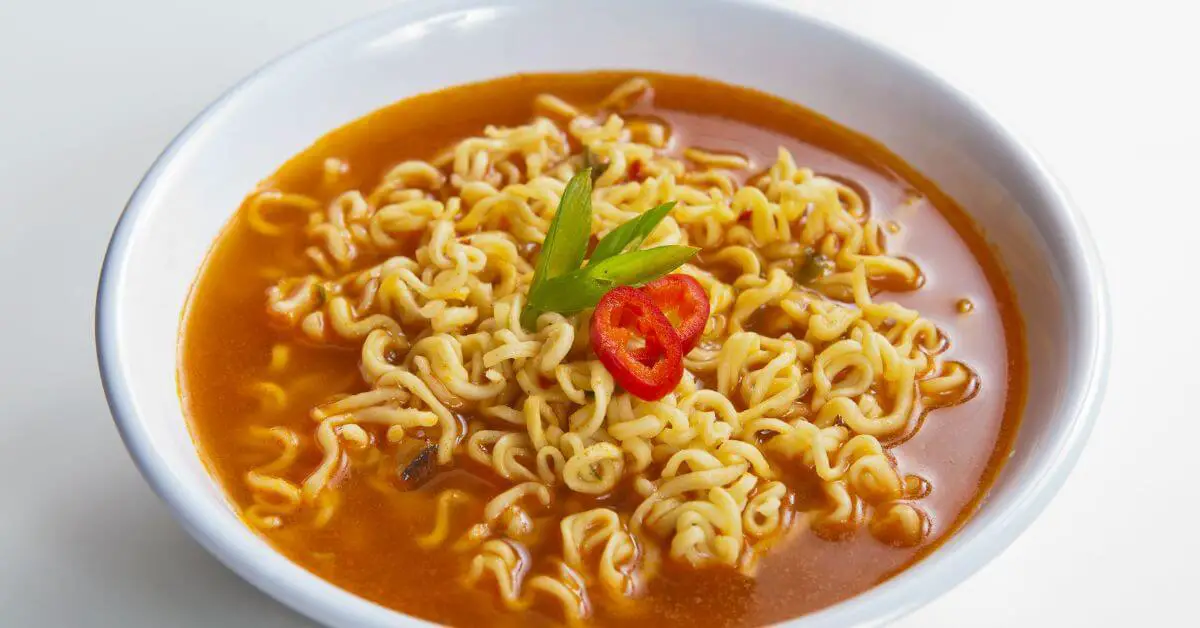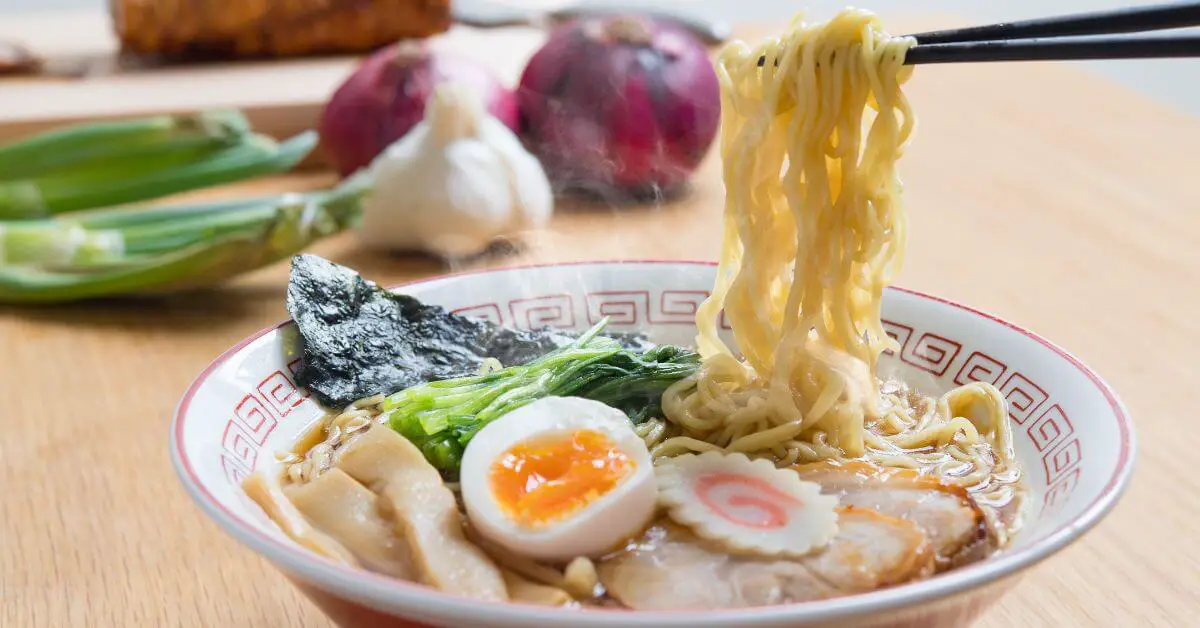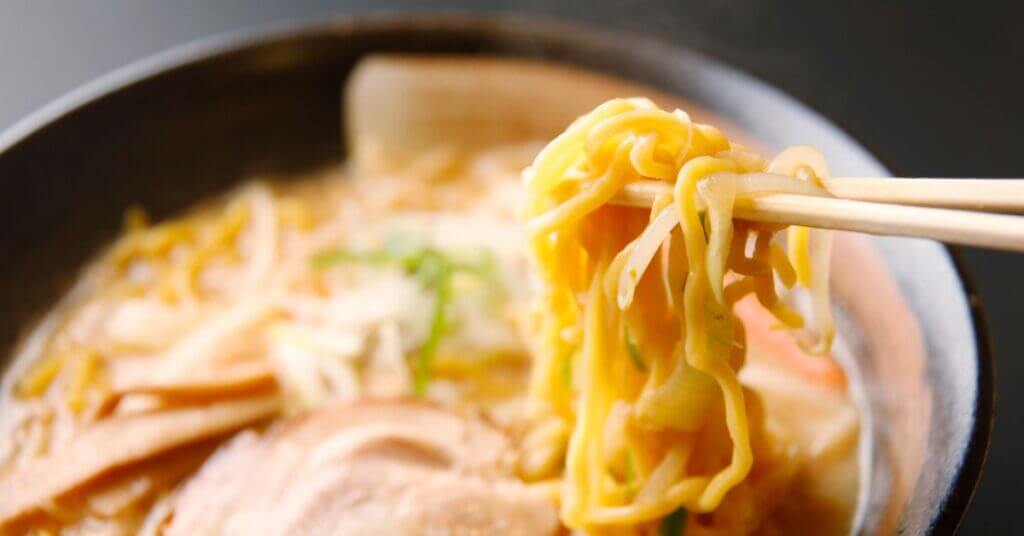Ramen, a staple in many households, often becomes the go-to meal during times of illness. Its warm broth and easy-to-eat noodles offer a comforting embrace when our bodies feel under the weather. However, the question arises: Is ramen good when sick? This article delves into the components of ramen, its impact on health during sickness, and healthier alternatives to consider. New to the world of ramen? Get tips on the best ways to enjoy this dish with How to Eat Ramen, enhancing your ramen experience.
The Composition of Ramen
Ramen’s primary allure lies in its simplicity: noodles, a flavor packet, and various additives. While convenient, it’s crucial to understand its nutritional profile. Typically, ramen is high in carbohydrates and sodium, but lacks essential nutrients and vitamins. A single serving can contain a significant portion of the recommended daily sodium intake, which can be a concern for hydration and blood pressure levels.
For a deeper understanding, explore the Nutritional Information of Ramen on Wikipedia. It’s important to balance ramen’s convenience with its nutritional limitations, especially when our bodies require more nourishment during illness.
Ramen’s Appeal During Illness
Ramen’s appeal during times of illness can be attributed to several factors, ranging from its ease of preparation to the comforting nature of warm, broth-based foods. Here’s a closer look at why ramen often becomes a go-to choice when we’re feeling under the weather:
Ease of Preparation and Consumption
- Quick and Simple: Ramen is renowned for its convenience. It requires minimal cooking skills and effort, making it an ideal choice for those who feel too weak or unwell to prepare a complex meal.
- Soft Texture: The noodles are easy to chew and swallow, which is particularly comforting for those with a sore throat or reduced appetite.
- Customizable: Ramen can be easily modified to suit individual tastes or dietary needs, even when energy and resources are limited.
Comforting Nature of Warm, Broth-Based Foods
- Warmth: The hot broth of ramen provides a soothing sensation, which can be particularly comforting when dealing with cold symptoms like chills or a sore throat.
- Hydration: The broth helps with staying hydrated, an important aspect of recovery during illness.
- Familiarity: For many, ramen is a familiar and nostalgic food, offering a sense of comfort and normalcy in times of discomfort and uncertainty.
Personal Anecdotes and Cultural References
- Cultural Comfort: In many cultures, especially in East Asia, ramen is a staple comfort food, often consumed in times of stress or illness.
- Childhood Memories: For some, ramen might be associated with fond memories, such as being cared for by a parent or loved one during past illnesses.
- Global Popularity: The widespread popularity of ramen means that it’s not just a comfort food in its countries of origin, but has become a global phenomenon, recognized and loved by people from various cultural backgrounds.
In essence, ramen’s appeal during illness is multifaceted. It’s not just about the ease of preparation or the comforting warmth it provides, but also about the emotional and cultural connections that many people have with this simple yet satisfying dish. Whether it’s a quick fix for nourishment or a nostalgic reminder of care and comfort, ramen holds a special place in the hearts of many, especially when they’re not feeling their best. Curious about celebrity-inspired ramen recipes? Check out the Kylie Jenner Ramen for a trendy take on this classic dish.
Health Considerations

When considering ramen as a food choice during illness, it’s important to be aware of several health considerations. While ramen can be comforting and convenient, its nutritional profile may not always align with the needs of a body in recovery. Here are some key health aspects to consider:
Sodium Content and Its Effects
- High Sodium Levels: Ramen, especially the instant variety, is known for its high sodium content. This can be a concern, as excessive sodium intake is linked to increased blood pressure and potential strain on the cardiovascular system.
- Dehydration Risk: High sodium can also lead to dehydration, a condition that’s particularly detrimental when sick, as the body requires adequate fluids to fight off illness and maintain normal functions.
- Balance with Hydration: If consuming ramen, it’s crucial to balance it with plenty of water or other hydrating fluids to counteract the dehydrating effects of sodium.
Lack of Essential Nutrients
- Limited Nutritional Value: Ramen typically lacks essential nutrients such as vitamins, minerals, and antioxidants, which are vital for supporting the immune system and overall health.
- Protein Deficiency: Most ramen varieties are low in protein, an essential macronutrient needed for repairing tissues and supporting the immune response.
- Fiber Shortage: The lack of dietary fiber in ramen can affect digestive health, which is already often compromised during illness.
Impact on Hydration and Digestion
- Hydration Concerns: As mentioned, the high sodium content can impact hydration levels. Proper hydration is key for recovery, aiding in everything from maintaining body temperature to flushing out toxins.
- Digestive Health: While ramen’s soft texture can be gentle on a sore or sensitive stomach, its lack of fiber and nutrients does little to support digestive health. In some cases, the additives and preservatives in instant ramen can also irritate the digestive system.
In summary, while ramen can offer comfort and convenience during sickness, it’s important to be mindful of its high sodium content, lack of essential nutrients, and potential impacts on hydration and digestion. Balancing ramen with more nutritious foods and plenty of fluids can help mitigate some of these concerns, making it a more suitable option during times of illness.
Alternative Healthy Additions to Ramen

Transforming a simple bowl of ramen into a more nutritious meal is quite straightforward and can significantly enhance its health benefits, especially when you’re feeling under the weather. Here are some suggestions for alternative healthy additions to ramen:
Vegetables
Adding vegetables to ramen not only boosts its nutritional value but also adds color and flavor. Consider these options:
- Spinach: A great source of iron and vitamins.
- Carrots: Rich in beta-carotene and fiber.
- Mushrooms: Offer a meaty texture and are good for the immune system.
- Bell Peppers: High in vitamin C and antioxidants.
- Bok Choy: Provides vitamins A and C, and calcium.
- Broccoli: Loaded with vitamins K and C, and fiber.
Proteins
Protein is essential for healing and maintaining muscle mass, especially when you’re sick. Here are some protein-rich additions:
- Chicken: Lean and easy to digest, it’s a classic addition.
- Tofu: A great plant-based protein source.
- Eggs: Boiled, poached, or softly scrambled eggs can be a great addition.
- Shrimp: Offers a low-fat protein option.
- Beef: Thinly sliced beef can add richness.
Herbs and Spices
Herbs and spices not only enhance flavor but can also provide health benefits:
- Ginger: Known for its anti-inflammatory properties.
- Garlic: Boosts the immune system and adds depth of flavor.
- Green Onions: Add a fresh, sharp taste.
- Cilantro: Brings a fresh and light flavor.
- Basil: Offers a unique aroma and taste.
Ways to Make Ramen More Nutritious
- Use Less of the Flavor Packet: To reduce sodium intake, use only a portion of the flavor packet or make your own broth.
- Add a Broth Base: Use chicken, vegetable, or beef broth as a base instead of water for cooking noodles.
- Incorporate Whole Grains: Opt for whole grain or brown rice ramen for added fiber.
- Balance with Fruits: Serve with a side of fruit like oranges or apples for a well-rounded meal.
By incorporating these healthy additions, you can turn a simple bowl of ramen into a more balanced and nutritious meal, making it a better choice when you’re in need of comfort food during sickness. For those looking to add protein to their ramen, explore versatile ways to incorporate chicken with these Thin Chicken Breast Recipes, perfect for any diet.
Ramen and the Common Cold
Ramen, often sought after during a common cold, can provide some relief and comfort. The warm broth of ramen is soothing for a sore throat, offering a gentle and easy-to-swallow option. This warmth can help alleviate throat irritation and provide a sense of relief. Additionally, the steam from the hot soup may aid in decongesting nasal passages, making it a favored choice for those with cold symptoms.
Beyond its physical benefits, ramen also offers psychological comfort. Eating familiar foods like ramen during illness can evoke feelings of comfort and nostalgia. This psychological aspect is significant, as familiar tastes and textures can bring a sense of normalcy and well-being during the discomfort of a cold. The act of enjoying a beloved dish like ramen can uplift spirits and contribute positively to overall well-being during recovery from a common cold.
Ramen and Digestive Issues
When sick, particularly with stomach flu or other gastrointestinal problems, the choice of food is crucial. Ramen, being a bland and easily digestible food, often becomes a go-to option for those who are sick and experiencing digestive discomfort. The simplicity of ramen, with its soft noodles and mild flavor, can be soothing when sick, as it’s gentle on the stomach and less likely to aggravate sensitive digestive systems.
However, for those who are sick with digestive issues, it’s important to consider the high sodium content in ramen. While ramen can be a comforting choice when sick, the sodium can potentially contribute to dehydration, which is a concern when recovering from stomach flu or similar illnesses.
In summary, while ramen can be a suitable food choice when sick with gastrointestinal problems due to its bland nature, it’s essential to balance its consumption with other hydrating and nutrient-rich foods. This approach ensures that while enjoying the comfort of ramen when sick, one doesn’t compromise on overall nutritional needs.
Expert Opinions
Nutritionists and healthcare professionals often have varied opinions on consuming ramen when sick. While some acknowledge its comforting nature, most advise against relying on it due to its nutritional deficiencies.
Experts suggest that a balanced diet, rich in vitamins, minerals, and hydration, is key to a speedy recovery. Foods rich in vitamin C, zinc, and antioxidants are particularly recommended. Ramen can be part of this diet if supplemented with healthier ingredients.
For professional advice on diet during illness, consulting resources like Keck Medicine of USC’s article on Ramen and Health can be enlightening. It’s important to consider expert opinions and make informed choices about what to eat when unwell.
FAQs
-
Is ramen soup good for you when you’re sick?
- Ramen can provide comfort due to its warm broth, which may soothe a sore throat and provide hydration. However, its high sodium content and lack of essential nutrients make it less ideal for recovery compared to more nutritious options.
-
Can eating ramen help with cold symptoms?
- While ramen’s warm broth can temporarily relieve symptoms like a sore throat and congestion, it does not contain immune-boosting nutrients that are crucial for fighting a cold.
-
Is ramen easy to digest when you have the flu?
- Ramen, being a bland and soft food, can be easy to digest, which might be beneficial for someone with stomach flu. However, its high sodium content might not be suitable for all, especially if dehydration is a concern.
-
Are there ways to make ramen healthier when sick?
- Yes, adding vegetables, lean proteins, and reducing the sodium content by using less of the flavor packet or making homemade broth can make ramen a more balanced meal.
-
Should ramen be avoided during certain illnesses?
- While ramen can be comforting, it’s best to avoid it or modify it to be healthier during illnesses that require a diet low in sodium or rich in specific nutrients, like gastrointestinal issues or high blood pressure.
This article provides a comprehensive look at the role of ramen during illness, balancing its comforting aspects with health considerations. While ramen can be a quick and easy meal, it’s important to enhance its nutritional value and consider healthier alternatives when necessary.
Conclusion
In conclusion, while ramen offers comfort and ease during illness, it falls short nutritionally. It’s high in sodium and lacks essential nutrients, making it less ideal for recovery. Balancing ramen with healthier foods and fluids is key for better health during sickness. Remember, food choices play a crucial role in recovery, so choose wisely.
